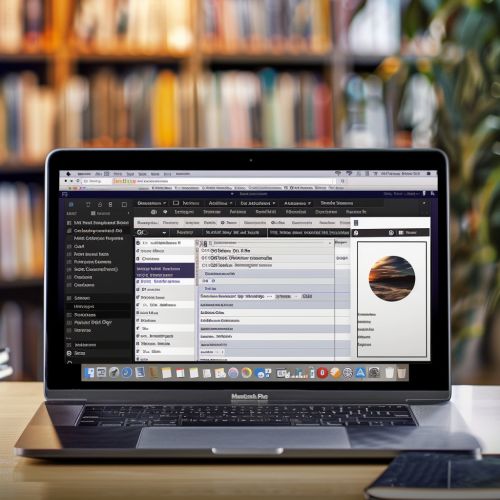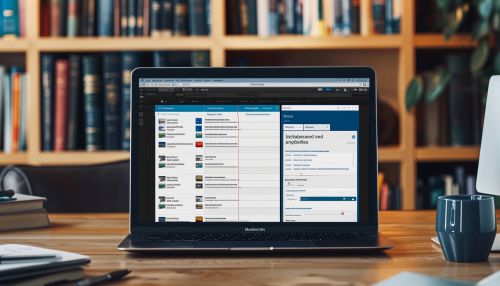Endnote (software): Difference between revisions
(Created page with "== Overview == EndNote is a reference management software package, used to manage bibliographies and references when writing essays, reports, and articles. It is produced by Clarivate Analytics (previously Thomson Reuters). EndNote is available for both Windows and macOS operating systems and is widely used in academic and professional settings for organizing and managing citations and references. == History == EndNote was first developed by Ric...") |
No edit summary |
||
| (One intermediate revision by the same user not shown) | |||
| Line 39: | Line 39: | ||
EndNote offers extensive customization options, allowing users to tailor the software to their specific needs. Users can create custom reference types, fields, and templates. The software also supports scripting, enabling advanced users to automate tasks and extend functionality using languages such as [[Python (programming language)|Python]] and [[AppleScript|AppleScript]]. | EndNote offers extensive customization options, allowing users to tailor the software to their specific needs. Users can create custom reference types, fields, and templates. The software also supports scripting, enabling advanced users to automate tasks and extend functionality using languages such as [[Python (programming language)|Python]] and [[AppleScript|AppleScript]]. | ||
[[Image:Detail-79821.jpg|thumb|center|Screenshot of EndNote interface showing reference management features.|class=only_on_mobile]] | |||
[[Image:Detail-79822.jpg|thumb|center|Screenshot of EndNote interface showing reference management features.|class=only_on_desktop]] | |||
== Usage in Academia and Research == | == Usage in Academia and Research == | ||
Latest revision as of 11:35, 20 May 2024
Overview
EndNote is a reference management software package, used to manage bibliographies and references when writing essays, reports, and articles. It is produced by Clarivate Analytics (previously Thomson Reuters). EndNote is available for both Windows and macOS operating systems and is widely used in academic and professional settings for organizing and managing citations and references.
History
EndNote was first developed by Richard Niles, a student at the University of California, Berkeley, in the late 1980s. The software was initially designed to help researchers manage their references and citations more efficiently. Over the years, EndNote has undergone numerous updates and improvements, expanding its functionality and user base. In 2016, Clarivate Analytics acquired the Intellectual Property and Science business of Thomson Reuters, including EndNote.
Features
EndNote offers a wide range of features designed to streamline the process of managing references and citations. These features include:
Reference Management
EndNote allows users to create and manage a personal library of references. Users can import references from online databases, library catalogs, and other sources. The software supports various reference types, including journal articles, books, conference papers, and websites. Users can organize references into groups and subgroups, making it easy to categorize and retrieve information.
Citation Styles
EndNote supports thousands of citation styles, including popular formats such as APA, MLA, and Chicago. Users can customize citation styles to meet specific requirements and create their own styles if needed. The software automatically formats citations and bibliographies according to the selected style, saving users time and effort.
Integration with Word Processors
EndNote integrates seamlessly with popular word processors, including Microsoft Word and LibreOffice. This integration allows users to insert citations and generate bibliographies directly within their documents. EndNote's "Cite While You Write" feature ensures that citations are correctly formatted and updated as the document is edited.
Online Collaboration
EndNote offers online collaboration tools that enable users to share their reference libraries with colleagues and collaborators. Users can create shared libraries, allowing multiple users to access and edit references simultaneously. This feature is particularly useful for research teams and academic groups working on joint projects.
PDF Management
EndNote includes tools for managing and annotating PDF files. Users can attach PDF files to references, highlight text, and add comments. The software also supports full-text search, making it easy to locate specific information within PDF documents.
Online Search
EndNote provides access to online databases and library catalogs, allowing users to search for and import references directly from within the software. This feature supports a wide range of databases, including PubMed, Web of Science, and Google Scholar.
Customization and Scripting
EndNote offers extensive customization options, allowing users to tailor the software to their specific needs. Users can create custom reference types, fields, and templates. The software also supports scripting, enabling advanced users to automate tasks and extend functionality using languages such as Python and AppleScript.


Usage in Academia and Research
EndNote is widely used in academic and research settings for managing references and citations. It is particularly popular among researchers, students, and librarians. The software's ability to handle large reference libraries and support various citation styles makes it an essential tool for academic writing and publishing.
Academic Writing
EndNote simplifies the process of writing academic papers by automating the management of references and citations. Users can easily insert citations into their documents and generate bibliographies in the required format. The software's integration with word processors ensures that citations are correctly formatted and updated as the document is edited.
Research Projects
EndNote is also used extensively in research projects to manage references and collaborate with team members. Researchers can create shared libraries, allowing multiple users to access and edit references simultaneously. This feature is particularly useful for large research teams and collaborative projects.
Library Management
Librarians use EndNote to manage and organize reference collections. The software's ability to import references from online databases and library catalogs makes it an invaluable tool for building and maintaining reference libraries. Librarians can also use EndNote to assist patrons with citation management and academic writing.
Comparison with Other Reference Management Software
EndNote is one of several reference management software packages available on the market. Other popular options include Zotero, Mendeley, and RefWorks. Each of these tools offers unique features and capabilities, catering to different user needs and preferences.
Zotero
Zotero is a free, open-source reference management tool that is popular among researchers and students. It offers similar features to EndNote, including reference management, citation formatting, and integration with word processors. Zotero also includes a web browser extension for capturing references directly from web pages.
Mendeley
Mendeley is a reference management tool and academic social network. It offers features such as reference management, PDF annotation, and online collaboration. Mendeley also includes a recommendation engine that suggests relevant papers based on the user's library.
RefWorks
RefWorks is a web-based reference management tool that is widely used in academic institutions. It offers features such as reference management, citation formatting, and integration with word processors. RefWorks also includes tools for managing and sharing reference libraries.
Licensing and Availability
EndNote is a commercial software package, and users must purchase a license to use it. The software is available for both Windows and macOS operating systems. EndNote offers several licensing options, including individual licenses, site licenses for institutions, and volume licenses for organizations.
Individual Licenses
Individual licenses are available for purchase directly from the EndNote website. These licenses are typically sold as perpetual licenses, allowing users to use the software indefinitely. EndNote also offers discounted pricing for students and academic institutions.
Site Licenses
Site licenses are available for academic institutions and organizations. These licenses allow multiple users to access the software, making it a cost-effective option for large groups. Site licenses typically include access to EndNote's online collaboration tools and support services.
Volume Licenses
Volume licenses are available for organizations that require multiple copies of the software. These licenses offer discounted pricing based on the number of users and include access to EndNote's support services and online collaboration tools.
Technical Support and Training
EndNote offers a range of support and training options to help users get the most out of the software. These options include online resources, user guides, video tutorials, and technical support services.
Online Resources
EndNote's website includes a comprehensive library of online resources, including user guides, FAQs, and video tutorials. These resources cover a wide range of topics, from basic reference management to advanced customization and scripting.
User Guides
EndNote provides detailed user guides that cover all aspects of the software. These guides are available for download from the EndNote website and include step-by-step instructions and screenshots.
Video Tutorials
EndNote offers a series of video tutorials that demonstrate how to use the software. These tutorials cover topics such as importing references, formatting citations, and using the "Cite While You Write" feature. The videos are available on the EndNote website and YouTube channel.
Technical Support
EndNote offers technical support services to help users with any issues they may encounter. Support is available via email, phone, and live chat. EndNote's support team can assist with installation, troubleshooting, and advanced customization.
Future Developments
EndNote continues to evolve, with new features and improvements being added regularly. Future developments are likely to focus on enhancing the software's integration with other tools and platforms, improving online collaboration capabilities, and expanding support for new citation styles and reference types.
Integration with Cloud Services
One area of potential development is the integration with cloud services such as Dropbox, Google Drive, and OneDrive. This integration would allow users to store their reference libraries in the cloud and access them from any device.
Enhanced Collaboration Tools
EndNote is likely to continue improving its online collaboration tools, making it easier for users to share and edit reference libraries. Future updates may include features such as real-time collaboration, version control, and advanced sharing options.
Support for New Citation Styles
As new citation styles are developed and existing styles are updated, EndNote will continue to expand its support for these formats. This ensures that users can always format their citations and bibliographies according to the latest standards.
See Also
- Reference Management Software
- Citation Style Language
- Bibliographic Database
- Academic Publishing
- Research Paper
